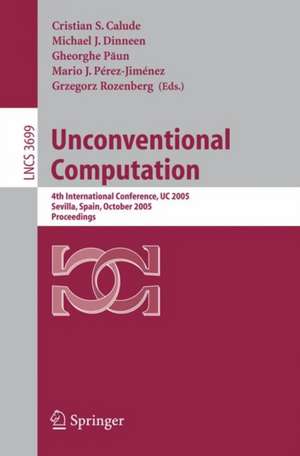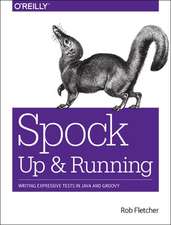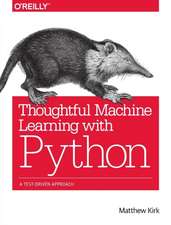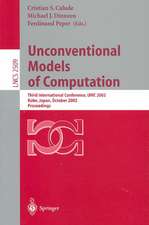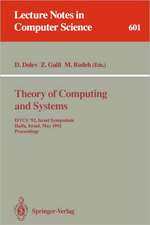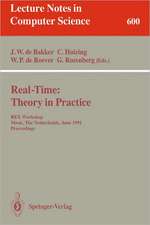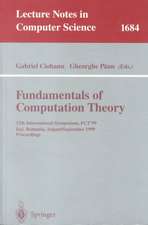Unconventional Computation: 4th International Conference, UC 2005, Sevilla, Spain, October 3-7, Proceedings: Lecture Notes in Computer Science, cartea 3699
Editat de Cristian S. Calude, Michael J. Dinneen, Gheorghe Paun, Mario de Jesus Pérez-Jiménez, Grzegorz Rozenbergen Limba Engleză Paperback – 19 sep 2005
Din seria Lecture Notes in Computer Science
- 20%
 Preț: 1061.55 lei
Preț: 1061.55 lei - 20%
 Preț: 307.71 lei
Preț: 307.71 lei - 20%
 Preț: 438.69 lei
Preț: 438.69 lei - 20%
 Preț: 645.28 lei
Preț: 645.28 lei -
 Preț: 410.88 lei
Preț: 410.88 lei - 15%
 Preț: 580.46 lei
Preț: 580.46 lei - 17%
 Preț: 427.22 lei
Preț: 427.22 lei - 20%
 Preț: 596.46 lei
Preț: 596.46 lei -
 Preț: 449.57 lei
Preț: 449.57 lei - 20%
 Preț: 353.50 lei
Preț: 353.50 lei - 20%
 Preț: 1414.79 lei
Preț: 1414.79 lei - 20%
 Preț: 309.90 lei
Preț: 309.90 lei - 20%
 Preț: 583.40 lei
Preț: 583.40 lei - 20%
 Preț: 1075.26 lei
Preț: 1075.26 lei - 20%
 Preț: 310.26 lei
Preț: 310.26 lei - 20%
 Preț: 655.02 lei
Preț: 655.02 lei - 20%
 Preț: 580.93 lei
Preț: 580.93 lei - 20%
 Preț: 340.32 lei
Preț: 340.32 lei - 18%
 Preț: 938.83 lei
Preț: 938.83 lei - 20%
 Preț: 591.51 lei
Preț: 591.51 lei - 15%
 Preț: 438.59 lei
Preț: 438.59 lei - 20%
 Preț: 337.00 lei
Preț: 337.00 lei -
 Preț: 389.48 lei
Preț: 389.48 lei - 20%
 Preț: 607.39 lei
Preț: 607.39 lei - 20%
 Preț: 1024.44 lei
Preț: 1024.44 lei - 20%
 Preț: 579.30 lei
Preț: 579.30 lei - 20%
 Preț: 763.23 lei
Preț: 763.23 lei - 20%
 Preț: 453.32 lei
Preț: 453.32 lei - 20%
 Preț: 575.48 lei
Preț: 575.48 lei - 20%
 Preț: 585.88 lei
Preț: 585.88 lei - 20%
 Preț: 825.93 lei
Preț: 825.93 lei - 20%
 Preț: 763.23 lei
Preț: 763.23 lei - 17%
 Preț: 360.19 lei
Preț: 360.19 lei - 20%
 Preț: 1183.14 lei
Preț: 1183.14 lei - 20%
 Preț: 340.32 lei
Preț: 340.32 lei - 20%
 Preț: 504.57 lei
Preț: 504.57 lei - 20%
 Preț: 369.12 lei
Preț: 369.12 lei - 20%
 Preț: 583.40 lei
Preț: 583.40 lei - 20%
 Preț: 343.62 lei
Preț: 343.62 lei - 20%
 Preț: 350.21 lei
Preț: 350.21 lei - 20%
 Preț: 764.89 lei
Preț: 764.89 lei - 20%
 Preț: 583.40 lei
Preț: 583.40 lei - 20%
 Preț: 649.49 lei
Preț: 649.49 lei - 20%
 Preț: 341.95 lei
Preț: 341.95 lei - 20%
 Preț: 238.01 lei
Preț: 238.01 lei - 20%
 Preț: 538.29 lei
Preț: 538.29 lei
Preț: 331.91 lei
Preț vechi: 414.89 lei
-20% Nou
Puncte Express: 498
Preț estimativ în valută:
63.51€ • 66.49$ • 52.55£
63.51€ • 66.49$ • 52.55£
Carte tipărită la comandă
Livrare economică 05-19 aprilie
Preluare comenzi: 021 569.72.76
Specificații
ISBN-13: 9783540291008
ISBN-10: 3540291008
Pagini: 284
Ilustrații: XI, 267 p.
Dimensiuni: 155 x 235 x 15 mm
Greutate: 0.4 kg
Ediția:2005
Editura: Springer Berlin, Heidelberg
Colecția Springer
Seriile Lecture Notes in Computer Science, Theoretical Computer Science and General Issues
Locul publicării:Berlin, Heidelberg, Germany
ISBN-10: 3540291008
Pagini: 284
Ilustrații: XI, 267 p.
Dimensiuni: 155 x 235 x 15 mm
Greutate: 0.4 kg
Ediția:2005
Editura: Springer Berlin, Heidelberg
Colecția Springer
Seriile Lecture Notes in Computer Science, Theoretical Computer Science and General Issues
Locul publicării:Berlin, Heidelberg, Germany
Public țintă
ResearchCuprins
Invited Papers.- Using Genetic Algorithms to Evolve Behavior in Cellular Automata.- Quantum Searching Amidst Uncertainty.- Logic Functions of the Genomic Cis-regulatory Code.- Structural DNA Nanotechnology: Molecular Construction and Computation.- Natural Inspiration for Artificial Adaptivity: Some Neurocomputing Experiences in Robotics.- Regular Papers.- On Self-assembly in Population P Systems.- A Web-Based P Systems Simulator and Its Parallelization.- Communication Complexity as a Principle of Quantum Mechanics.- On Model-Checking of P Systems.- Looking for Simple Common Schemes to Design Recognizer P Systems with Active Membranes That Solve Numerical Decision Problems.- P Systems with Active Membranes, Without Polarizations and Without Dissolution: A Characterization of P.- Discrete State Transition Systems on Continuous Space-Time: A Theoretical Model for Amorphous Computing.- On Reversible Cellular Automata with Finite Cell Array.- A Computational Model for Self-assembling Flexible Tiles.- On Formulations of Firing Squad Synchronization Problems.- Computation in One-Dimensional Piecewise Maps and Planar Pseudo-Billiard Systems.- On the Importance of Parallelism for Quantum Computation and the Concept of a Universal Computer.- On Computational Complexity of Counting Fixed Points in Symmetric Boolean Graph Automata.- A New Sibling of BQP.- A Twelve-State Optimum-Time Synchronization Algorithm for Two-Dimensional Rectangular Cellular Arrays.- Computing by Self-reproduction: Autopoietic Automata.- Lower Bounds on the Computational Power of an Optical Model of Computation.- On Counterfactual Computation.
